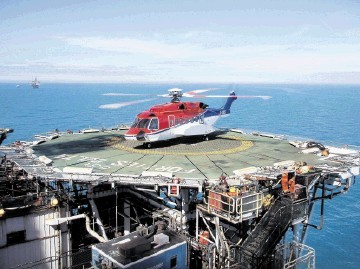
North Sea helicopter provider CHC has chalked up losses of £1.4million due to the grounding of its fleet of Airbus-made EC225 Super Pumas.
The Canadian company yesterday said the temporary suspension of its EC225 fleet had an “adverse effect” on its results for the year ended 30 April 2014 when pre-tax profits fell 60% to £3.3million.
Turnover rose 1.19% to £180million for the year due to contract wins and efficiencies, the firm said.
All Super Puma flights to and from UK offshore installations were temporarily halted in late 2013 after a CHC-operated helicopter – an L2 -type – plunged into the sea near Shetland, killing four people.
EC225s, which make up about 50% of the North Sea’s helicopter transport, had only just resumed commercial services after a 10-month hiatus prompted by two non-fatal ditching incidents in 2012.
Speaking about the results, CHC president and chief executive Karl Fessenden said: “Despite the current uncertainty in the oil and gas industry, we believe the long-term demand for CHC’s services – especially transportation to deepwater and ultra-deepwater oil and gas production locations, which represents about 80% of our flying revenue – will grow.
“In the short-term, however, we are intensely focused on reducing CHC’s cost structure and improving capital efficiency to match the market environment, while maintaining an absolute commitment to industry-leading safety, availability and reliability.”
The company’s six directors were paid £816,000 in total, down £19,000 year-on-year, with the highest earner, whose identity was not disclosed, pocketing £241,000.
The figures were revealed in CHC Scotia accounts released by Companies House yesterday.
During the year, CHC operated 30 helicopters from Aberdeen, Humberside and North Denes for the oil and gas industry, as well as three search and rescue helicopters based in Portland and Lee-on-Solent.
CHC yesterday said recent “major contract wins and retentions” had created a solid platform for future growth, adding that it will continue to invest in its core markets of oil and gas, and search and rescue.
In December it unfurled plans to spend millions of pounds to create a “world class” terminal and hangar complex at Aberdeen International Airport, which would allow its engineers to increase the number of aircraft they can service.
The company said it had 477 staff at the end of April 2014.
Recommended for you
